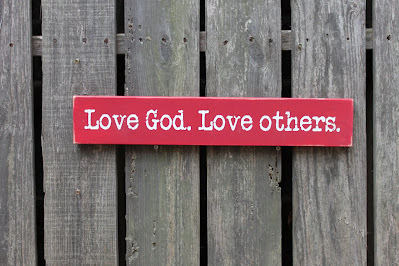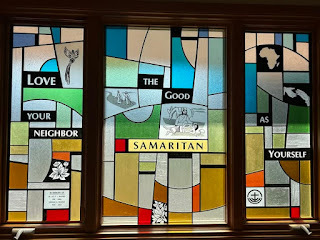5 Pentecost

GoodSamaritan Sunday
July13, 2025
Luke10.25-37
+I have shared with you many times that I am no natural-born preacher.
Ihave never felt like I’m a very good preacher.
Thiswas only confirmed by a near-apocryphal stories we all know here at St. Stephen’s:
DonnaClark shares that on her first Sunday at St. Stephen’s some ten years ago,after Mass, she was down-stairs at coffee hour in the undercroft.
Aparishioner who has since moved out East (one who I knew well and was close totheir family) say down at her table and announced: That was the worst sermon I’veever heard in my life!
Idon’t doubt it.
But,for all my homiletical lacking, let’s face it: I’m a consistent preacher.
Forthose of you who listen or read my sermons week in and week out, you know thatmy “themes” are pretty basic and consistent.
Yes,there might be variations on those “themes,” but, in their core, there isreally only one main “theme” to everything I preach.
LoveGod. Love others. That’s pretty much it.
Whichis why our Gospel reading this morning is an important reading.
No,I’m not being emphatic enough.
It’snot just an important reading.
Itis, in my opinion, the single most important reading for us as Christians.
And,for those of you who have known for me for any period, you know how I feelabout what is being said in today’s Gospel.
Forme, this is absolutely IT.
Thisis the heart of our Christian faith.
Thisis where the “rubber meets the road.”
Whenanyone has asked me, “What does it mean to be a follower of Jesus?” it is thisscripture I direct them to.
Whenanyone asks me, must I do this or that to be “saved,” I direct them to thisreading.
Thisis what it is all about.
So,why do I feel this way?
Well,let’s take a look this all-important reading.
Wehave two things going on.
First,we have this young lawyer.
Lawyerhere meaning a interpreter of Judaic Law—the Law of Moses, found in the Torah.
Hecomes, in all earnestness, to seek from Jesus THE answer.
“Whatmust I do to inherit eternal life?”
Whatmust I do to be “saved?”
This,after all, is the question we are ALL asking, isn’t it?
And,guess what?
He—andall of us too—gets an answer.
But,as always, Jesus flips it all around and gives it all a spin.
Jesusanswers a question with a question.
(Avery rabbinic thing to do)
Heasks the lawyer, “what does the law say?”
Theanswer is a simple one.
And,in Jewish tradition, it is called the Shema.
TheShema is heart of Jewish faith.
Itis so important that it is prayed twice a day, once in the morning, once atnight.
Jesushimself would have prayed the Shema each morning upon awakening and againbefore he went to sleep at night.
Ido it. I pray the Shema in the morning on waking and before I go to sleep atnight.
It’svery good spiritual discipline.
Itis important, because it is the heart of all faith in God.
So,what is the answer?
Theanswer is, “You shall love the Lord your God with all your heart, , and withall your soul, and with all your strength, and with all your mind.”
Ourheart.
Oursoul
Ourstrength
Ourmind.
Inother words—our very essence.
Andadditionally, “and [love] your neighbor as yourself.”
Then,Jesus says this:
“dothis, and you will live.”
Irepeat it.
Dothis—Love God, love your neighbor—and youwill live.
This is what we must do to besaved.
Nowthat sounds easy.
ButJesus then complicates it all with a parable.
Andit’s a great story.
Everyonelikes this story of the Good Samaritan.
Weeven commemorated it in our very first stained glass window.

Afterall, what isn’t there to like in this story?
Well…actually…inJesus’ day, there were people who would not have liked this story.
InJesus’s day, this story would have been RADICAL.
Thepart of this story that most of us miss is the fact that when Jesus told thisparable to his audience, he did so with a particular scheme in mind.
Theterm “Good Samaritan” would have been an oxymoron for those Jews listening toJesus that day.
Samaritanswere, in fact, quite hated.
Theywere viewed as heretics, as defilers, as unclean.
Theywere seen as betrayers of the Jewish faith and Jewish Law.
(Remember,he’s speaking to a lawyer---an interpreter of Jewish Law).
So,when Jesus tells this tale of a Good Samaritan, it no doubt rankled a fewnerves in the midst of that company.
With this inmind, we do need to ask ourselves some very hard questions.
Hard questionswe did not think we would be asked on this Good Samaritan Sunday.
You, of course,know where I am going with this.
So, here goes:
Who are theSamaritans in our understanding of this story?
For us, the story only really hits home when we replace that term “Samaritan”with the name of someone we don’t like at all.
Just thinkabout who it is in your life, in your political understanding, in your ownorbit of people who you absolutely despise.
Think of thatperson or persons or movements that simply makes you writhe with anger.
The Ice Agent
The thief.
The homophobe.
The transphobe.
The libtard
The adulterer
The drugaddict.
The snowflake.
The MAGA/Trumper
The communist
The white supremacist.
The atheist.
The nazi.
The socialist.
The fascist.
Whoever may bethe current President of the United States.
Those are yourSamaritans!
Now, try to putthe word “good” in front of those names.
It’s hard for manyof us to find anything “good” in any of these people.
For us, to facethe fact that these people we see as morally or inherently evil could be“good.”
We—goodsocially-conscious Christians that we are—are also guilty sometimes of beingcomplacent.
We too findourselves sometimes feeling quite smug about our “advanced” or “educated” waysof thinking about society and God and the Church.
And we toodemonize those we don’t agree with sometimes.
As you allknow, I, for one, am very guilty of this
Itis easy for me to imagine God living in me personally, despite all theshortcomings and negative things I know about myself.
Iknow that, sometimes, I am a despicable person and yet, I know that God isalive in me, and that God loves me.
So,why is it so hard for me to see that God is present even in those whom Idislike, despite those things that make them so dislikeable to me?
Forme, this is the hard part.
TheGospel story today shows us that we must love and serve and see God alive ineven those whom we demonize—even if those same people demonize us as well.
Beinga follower of Jesus means loving even those we, under any other circumstance,simply can’t stand.
Andthis story is all about being jarred out of our complacent way of seeingthings.
It’s also easy for some of us to immediately identify ourselves with the GoodSamaritan.
We,of course, would help someone stranded on the road, even when it means makingourselves vulnerable to the robbers who might be lurking nearby.
Right?
ButI can tell you that as I hear and read this parable, I—quite uncomfortably—findmyself sometimes identifying with the priest and the Levite or Lawyer.
Iam the one, as much as I hate to admit it, who could very easily, out of fearor because of the social structure in which I live, find myself crossing overto the other side of the road and avoiding this person.
AndI hate the fact that my thoughts even go there.
See,this parable of Jesus is challenging and difficult.
But…
Somethingchanges this whole story.
Somethingdisrupts this story completely.
Love changes this whole story.
Whenwe truly live out that commandment of Jesus to us that we must love God andlove our neighbor as ourselves, we know full-well that those social andpolitical and personal boundaries fall to the ground.
Lovealways defeats our dislike—or hatred— of someone.
Lovesoftens our hearts and our stubborn wills and allows us see the goodness andlove that exists in others, even when doing so is uncomfortable and painful forus.
Now I say that hoping I don’t come across as naïve.
Iknow that my love of the racist will not necessarily change the racist.
Iknow that loving the homophobe will not necessarily change the homophone.
Iknow that loving the Nazi and the Fascist are definitely not going to changethe Nazi and the Fascist.
AndI was to be VERY clear: love does NOT mean acceptance.
Itdoes not mean accepting their hatred and their bigotry.
Trustme, I know that loving certain politicians (whose names I will not mention,despite the fact that the IRS has now given me permission to do so) is notgoing to change those politicians!
Butyou know what?
Itdoes change me.
Itdoes cause me to look—as much as I hate to do so—into the eyes of that personand see something more—despite their shortcomings, despite their hatred.
Itdoes cause me to look at the person and realize that God does love this persondespite their failings and their faults—just as God loves me despite myfailings and my faults.
These are the boundaries Jesus came to break down in us.
Andthese are the boundaries Jesus commands us to break down within ourselves.
“Whatmust I do to inherit eternal life?” the lawyer asks Jesus.
Andwhat’s the answer?
Loveis the answer.
Wemust love—fully and completely.
“Do this,” Jesus says, “and you willlive.”
Whatwill save us?
Lovewill save us.
Loveof God.
Loveof one another.
Lovingourselves.
Lovingwhat God loves.
Lovewill save us.
Lovewill liberate us.
Lovewill free us.
Jesusdoesn’t get much clearer than that.
Becauselet’s face it.
Weare the Samaritan in this story.
Weare—each of us—probably despised by someone in our lives.
Iknow I am!
We,to someone, represent everything they hate.
Thefact is, God is not expecting us to be perfect.
Godworked through the Samaritan—the person who represented so much of whateveryone who was hearing that story represents as wrong.
Afriend of mine once shared a story about how he was in Memphis when he came acrossa church that met in an old movie theatre.
Onthe marquee was written:
IFGOD CAN SPEAK THROUGH BALAAM’S ASS, GOD CAN SPEAK THROUGH YOU.
IfGod can work through the Goos Samaritan. let me tell you, God can work throughyou and me.
Wedo not have to be perfect.
Trustme, we’re not perfect!
Andwe will never be perfect.
Buteven despite this, God’s light and love can show through us.
Solet us reflect God’s love and light.
Letus live out the Shema of God—this commandment of God to love—in all aspects ofour lives.
Letus love.
Letus love fully and radically and completely.
Letus love God.
Letus love each other.
Letus love ourselves.
Letus love all that God loves.
Letus love our neighbor.
Whois our neighbor?
Ourneighbor is not just the one who is easy to love.
Ourneighbor is also the one who is hardest to love.
Lovethem—God, our neighbor—and yes, even ourselves.
Andif we do that, you and I—we too will live, as Jesus says.
Andwe will live a life full of the light we have reflected in our own lives.
Andthat light that will never be taken from us.



